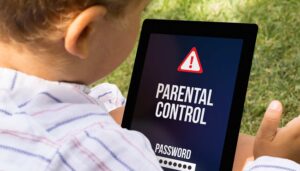Parents think about a kid’s online safety because when they’re online they’re calm, but they don’t know what they’re staring at, says Nic Wetton, the head teacher of JH Godwin Primary School in Chester.
She instructs their silence is often misleading. Kid’s online safety, Children can be traumatized by horrific videos they see online, tells the head teacher who has 180 students aged from four-and-a-half to eleven in her care.
Ms. Wetton tells she sees children as young as six playing 12-rated computer games online. We’ve had lawsuits of children wanting medication to snooze. This is enormously worrying.
Kid’s online safety, Some children coming into school are unfamiliar in class because they’ve been up all night, playing on devices such as tablets or phones. One recent craze was to see who in a WhatsApp group could stay up the lengthiest – the winner sent a message at 04:00.
As well to staring at inappropriate content online, or staying up too late, children who are online unsupervised can be susceptible to pedophiles.
These issues are common to Rachel O’Connell. She has investigated online child abuse, working on statistical procedures to identify abusers. That’s why Kid’s online safety is important.
In the course of her research, kid’s online safety, she went online presenting as an eight-year-old child who hadn’t made companions at school. Her understanding of the mindset of predators is comprehensive as well as chilling, such as, she says that isolated children are often a target: They look for that, she illustrates.
Ms. O’Connell stays at school as well as finds many parents have no idea which apps their kids can access. Putting naked selfies online appears to be a rite of passage now, she tells. Parents feel like they don’t know how to digitally parent, they can feel very helpless. We desire oversight. They need Kid’s online safety.
One significant problem is that children can be targeted while scanning sites that are theoretically off-limits for new people.
So, deterring children from getting access to any of these sites would help attack the problem.
Business by Ms. O’Connell
The business founded by Ms. O’Connell, TrustElevate, is based on the principle of Zero Data – organizing whether a child should be allowed to log onto a service but without giving away any private details regarding that child.
Ms. O’Connell has been trialing Zero Data techniques with mobile phone operator, EE. She wants to build a family access app that will screen users for their age as well as seek parental authorization.
TrustElevate software develops a token containing just the child’s age range and no private information, this information authorizes a service provider to check out a potential new user for Kids online safety.

While the service provider can block entry, if the details don’t tally with the permissions held on the system, the token cannot be influenced to push other services, or commodities, to the child, For Kids online safety.
These kinds of technical tools are a help, but many schools are fighting back as well.
Workshops by Ms. Wetton
At JH Godwin School, Ms. Wetton runs online safety workshops, where parents are persuaded to bring a laptop along so they can download Kid’s online safety apps and parental supervision.
To her frustration, engagement from her parents was not available. She has organized workshops where just one parent turned up out of 150 who have Kid’s online safety at the school.

Ms. Wetton has even tried a tactical approach, putting online security talks ahead of prominent events, such as the Christmas, or Easter bingo sessions. However, she has had heckles from people who felt they shouldn’t be addressed on their evening out.
So, the school is left to come up with logical measures to shield its children from violent online contact.
For example, she proposes not wearing a school-branded jumper while on TikTok. “If any youngsters do that, then they start watching and understand where they are going to be at 0800 as well as 1600.
She believes Kid’s online safety apps should be front-loaded onto any device a teenager might use.
That’s better than waiting for a mental health epidemic in the very young? Additionally, computer games can be addictive. If we don’t protect them, we get bored with Kid’s online safety coming here, and it’s like attempting to teach an empty vessel that just won’t fill.

INTERESTING FACTS ABOUT TEDDI SIDDALL
She wants to see tech corporations made to feel responsible for safeguarding, through measures such as age confirmation software.
And TrustElevate’s Ms. O’Connell, says the government should be doing a lot more to legislate children’s access to games as well as websites.
There’s no oversight into that during the period, no supervision into the effect of it.
A UK government Online Harms White Paper published in 2019, noted that 12-15-year-olds spend over 20 hours a week online. And regulator, Ofcom, states that 79% of that group had experienced at least one potentially dangerous experience online in the last year.
The Online Safety Bill, currently before Parliament, will submit a duty to protect children from toxic, or inappropriate material.
The Bill does not prescribe which technology tools should be used to do this, but Ofcom may respond to failures to conserve children by approving the use of age verification systems.

Speaking to BBC News, Chris Philp, Minister for Tech as well as the Digital Economy, lays out what he believes will be a much more rigorous operating environment for online strategies in the future.
If platforms want children to use their services, they will need to protect them from accessing content that is toxic or improper. If their services are meant for adults, they will need to deter underage access.
EVERYTHING ABOUT OUTER BANKS SEASON 3 SO FAR
He insists that schools and parents wrestling with online dangers will be helped by rigorous government measures. Those who fail to accept, will face huge fines and risk their services being blocked from admission in the UK.
At JH Godwin School tougher insurance measures would be warmly welcomed. Ms. Wetton describes the gulf between how big tech presents its role in society as positive and the unintended effects in the real world. That’s why Kid’s online safety is significant.
Live streaming services are presumed to bring ‘like-minded people’ together, but in fact, it implies predators using search tasks like ‘girls dancing’.
She knows Kid’s online safety, the tech and techniques pedophiles use, such as matching their pace to their aim at victims. These people are patient and work on a child, so we must unlock their eyes [to potential dangers.

